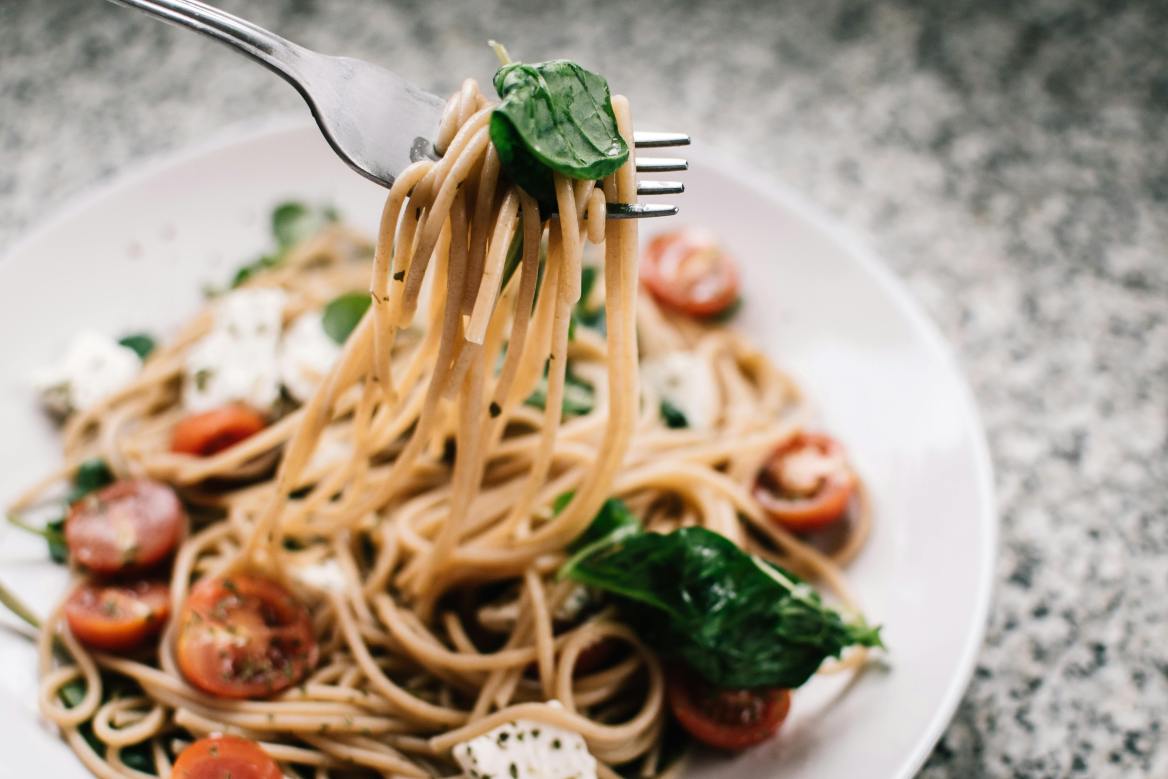Ingredients:
• 10 oz.penne pasta (option: a cup and half of cooked brown rice, quinoa, farro)
• 2 T extra-virgin olive oil, plus more for drizzling Or use oil from sun-dried tomatoes.
• 2-4 garlic cloves, sliced or minced
• 1 yellow squash and 1 zucchini, sliced into thin half-moons
• 1 bunch asparagus, chopped into 1-inch pieces (Option: sliced kale or spinach will also work!)
• 1 C cherry tomatoes, halved or ½ C drained, sliced sun-dried tomatoes drained of their oil
• 1 C thinly sliced spring onion/scallion
• 1 tsp sea salt or regular salt
• ½ C frozen peas, thawed or fresh spring snow peas, if you can find them!
• ¾ C grated pecorino cheese (Substitute parmesan or grana, if you have that on hand.)
• 3 T fresh lemon juice
• Red pepper flakes
• 1 C fresh basil leaves or (1 T dried), plus more for garnish
• ¼ C fresh tarragon, optional
• Freshly ground black pepper
Instructions:
1. Bring a large pot of water to a boil. Add 1 T salt. Prepare the pasta according to the package instructions, cooking until al dente. Drain.
2. Meanwhile, heat the oil in a large, deep skillet over medium heat. Add your spring vegetables like asparagus or greens, sliced small yellow squash and/or zucchini, cherry tomatoes, spring onions.
3. Add a few preserved vegetables like, garlic and sun-dried tomatoes (if you don’t have fresh cherry tomatoes).
4. Add salt, and several grinds of pepper and sauté for 3 to 4 minutes, or until the vegetables are tender.
5. Add cooked pasta (or other grain like cooked brown rice, quinoa or farro), peas, cheese, lemon juice, and seasonings. Add fresh herbs, if you are using and toss to combine.
6. Season to taste, garnish with more basil, and serve.
Options: Add heavy cream and serve it warm. For a cold pasta (or rice) salad, add your favorite vinaigrette dressing. If you prefer, add leftover chicken or ham. Cooked Cannellini garbanzo beans (chickpeas) make it vegetarian.
Serve with garlic bread and a side salad. Try some spring Rhubarb Crisp for dessert! See the Seasoned Franciscan post of June 14, 2024.
Story of Seasonal Spring foods and World Environment Day:
Pasta primavera originated in the 1970’s in a famous NYC Italian restaurant named Le Cirque. Primavera means “in the style of springtime". Prima = first or early: vere = “truly”. Primavera usually means a dish using earliest garden vegetables that are only available for a few weeks in the farmer’s market or your garden.
World Environment Day on June 5th, 2025 is the United Nations’ principal means to bring more awareness and action for the environment. Held since 1973, the 2025 theme is Ending Plastic Pollution which is part of the UN Sustainable Development Goals. Ocean scientists are concerned about the growing plastic crisis in the world’s ocean. Plastic not only harms ocean life, but plastics in our food goes beyond fish and seafood to other animal protein and even the produce we eat The FDA (Food and Drug Administration) has studied these food contaminants.
What we buy and how products are made are important to economic and social development around the world. Goal # 12, paragraph 28 of the UN 2030 Agenda for Sustainable Development reads: “We (Countries) commit to making fundamental changes in the way that our societies produce and consume goods and services. Governments, international organizations, the business sector and other non-state actors and individuals must contribute to changing unsustainable consumption and production patterns." Consider the "we" and be aware, grateful and joyful when using the gifts of the earth!
Invitations to act:
Cooking seasonal recipes (like Pasta Primavera) and supporting organic farmer producers are part of sustainable eating.
Recommit to reduce use of plastic and to recycle. Green Matters is an excellent site that offers information about what plastics are/are not recyclable. Avoid unrecyclable plastics marked #3, #6, or #7. Check with your recycling center.
Check out ways to cut back on our use of plastic from The Center for Science in the Public Interest
Scientific American describes ways that plastic gets into our food. Warning: it is alarming!
There is hope! A global treaty to address plastic pollution is being negotiated through The United Nations as well as ways to create a “circular economy”.
The European Union’s definition of the circular economy is sharing, leasing, reusing, repairing, refurbishing and recycling existing materials and products as long as possible rather than the pattern of take-make-consume-throw away with no regard for energy or the earth and its creatures. These sound like Laudato Si values!





Post a Comment